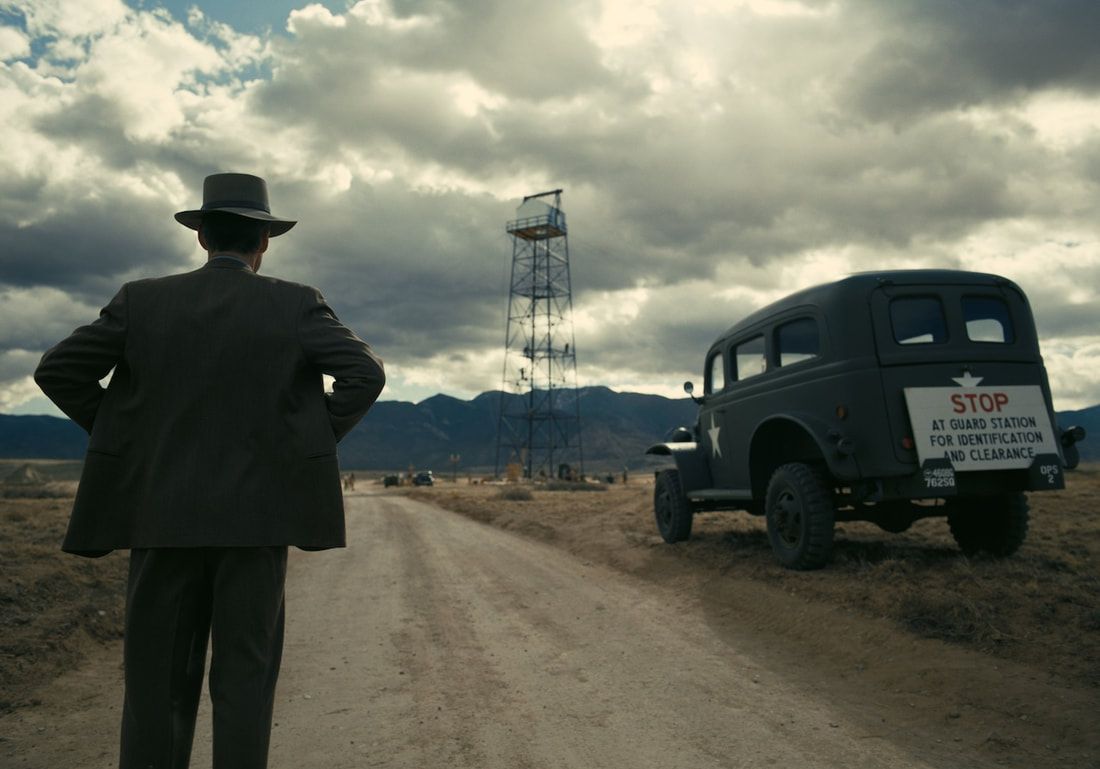Review:
"Oppenheimer"

Release Date: July 21, 2023
Rating: R Running Time: 180 minutes “Try not to blow up the world,” Matt Damon’s General Leslie Groves tells Cillian Murphy’s J. Robert Oppenheimer on the eve of the 1945 Trinity nuclear test in New Mexico, a climactic sequence in writer/director Christopher Nolan’s Oppenheimer that not just defines his notoriously complex theoretical physicist subject but also this sweeping, chillingly executed biography. Grove’s half-joke, half-command speaks to the obvious but none-the-less frightening uncertainties surrounding the development and building of a new bomb designed to wipe out thousands of people in one foul swoop. Nolan fuels Oppenheimer with the inherent fear that comes with the creation of a weapon of mass destruction, one that can and does change the course of history and one that remains a threat to humanity despite the so-called “Nuclear Deterrence” theory. Just recall Russian President Vladimir Putin’s recent sabre rattling involving the potential use of tactical nuclear weapons. Nolan grew up during the Cold War, and while a push-button war seemed remote in the 1980s, the possibility that it could have occurred clearly shapes Nolan’s approach to Oppenheimer as well as his profound interest in the work, professional accomplishments, personal failures, and eventual repudiation of the so-called “Father of the Atomic Bomb.” Over the course of the first two hours, through a non-linear narrative that helps distinguish Oppenheimer the man from Oppenheimer the myth, Nolan builds toward the test with a combined sense of anticipation and dread. The test itself may prove to be the key to the end of World War II or set off a devastating chain reaction. It’s all theory until the text is conducted, which Nolan executes as an beautiful but terrifying display of man’s ability to create and man’s ability to destroy. And, as expected, Nolan refuses to make this a moment of relief or triumph. He positions the creation of the bomb as a necessary evil to end a war the Japan continued to wage after the surrender of Germany (although, as the film addresses, there was much debate as to whether Japan would have still surrendered in August 1945 even if the United States had not bombed Hiroshima and Nagasaki). If the first 30 minutes of Oppenheimer is dedicated to establishing the physicist’s intellectual capacity, curious but resolute mind, and (communist-sympathetic) political beliefs, the final hour follows his lobbying for nuclear deterrence, which results in his professional downfall and public disgrace at the hands of his detractors. This is detailed through an hearing that Oppenheimer attends to appeal the denial to renew his national security clearance, a move designed to damage his credibility among the public, the scientific community, the government, and the military. Nolan does not depict Oppenheimer as a hero but as a man of science faces with an inevitable choice: do nothing, and watch the war drag on as millions of his fellow Jews died at the hands of Hitler, or play God. “Now I Am Become Death, the Destroyer of Worlds,” Oppenheimer famously quoted from the Hindu scripture, the Bhagavad-Gita, in regards to the Trinity test, which is recited several times in Nolan’s film. As Nolan emphasizes, Oppenheimer clearly knew his place in history and understood that he could not put the genie back in the bottle no matter how hard he tried. Cillian Murphy fully embraces Oppenheimer’s egoism, flaws, and contradictions as much as he does his unquenchable thirst for knowledge, sense of purpose and conviction, and development of conscience. Oppenheimer’s goal is not necessarily for us to walk away liking him or admiring his achievements but to understand who he was, what he had to do at a time his country needed him, appreciate the moral dilemmas he faced during and after World War II, and fully know the consequences of his actions even if he was insulated by the distance between him and test thousands of people his bombs killed in August 1945 or later in life as well as the New Mexico residents who grew sick because of downwind radiation exposure. Nolan certainly does not shy away from examining Oppenheimer’s problematic relationship with his girlfriend Jean Tatlock and his rocky marriage to the loyal but occasionally frustrated wife, Katherine. Florence Pugh plays Jean more as a haunting presence while Emily Blunt channels much of Katherine’s fiery strength and determination into Oppenheimer when he is at his most weakest and vulnerable. In fact, during a confrontation that requires Katherine to vigorously come to her seemingly defeated husband’s defense, Blunt presents Katherine as such a sly and unstoppable force of nature that she will likely earn an Oscar nomination for this one scene alone. We learn as much about Oppenheimer’s motivations, personal and political beliefs, and shortcomings through his lacking interactions with Jean and Katherine as we do when we watch him at work at the Los Alamos Laboratory in New Mexico. In a film replete with stand-out performances—most notably Matt Damon as the steadfast General Leslie Groves, Casey Affleck as the ominious U.S. Army Military Intelligence Officer Boris Pash, Tom Conti as Albert Einstein, David Krumholtz, Josh Hartnett, and Benny Safdie as physicists advising, working with or sometimes against Oppenheimer—the actor who impresses the most is Robert Downey Jr. He is captivating as Lewis Strauss in a subplot that runs parallel to Oppenheimer’s rise and fall. In the film, Strauss—a businessman who helped develop the U.S. nuclear weapons policy in his capacity as head of the U.S. Atomic Energy Commission—faces tough questions on his past working relationship with Oppenheimer during a Senate hearing to confirm Strauss as Secretary of Commerce. Just as Oppenheimer cannot put behind him his work in New Mexico, Strauss cannot disassociate himself with Oppenheimer and the rest of the scientific community he alienated. Nolan masterfully weaves together Oppenheimer and Strauss’ storylines so their fates are inexplicably linked at the end of the film. History has all but forgotten Strauss but because of Downey’s increasingly agitated portrayal of a man blinded by his own ambition and perceived slights, Strauss will be remembered once again for years to come for his ties to Oppenheimer. As for Oppenheimer himself, Nolan’s biography—gripping from start to finish, told in electrifying fashion and in color and black and white to showing shifting perspectives—does not seek to praise or to condemn but to study the man who came to believe he was the Destroyers of Worlds. To Nolan, Oppenheimer judged himself before history could judge him. Robert Sims Aired: July 26, 2023. Web sites: https://www.universalpictures.com/movies/oppenheimer |
|
